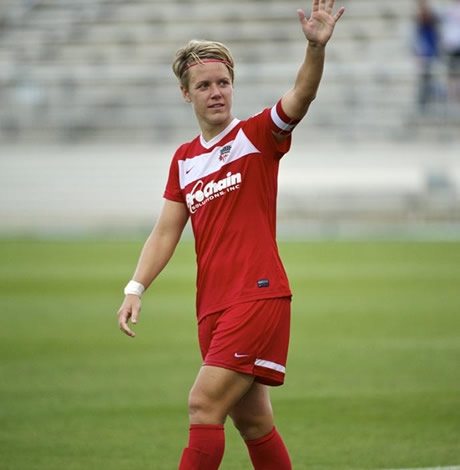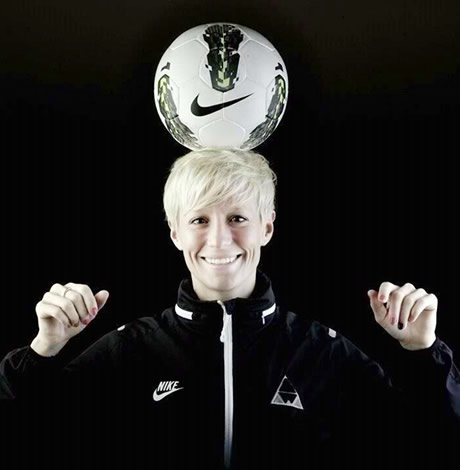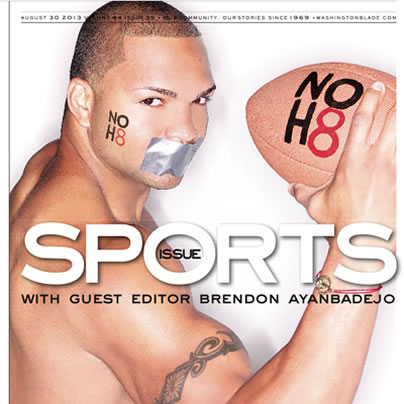Sports
A timeline of progress in U.S. sports
Looking back on influential coming out stories since 1975
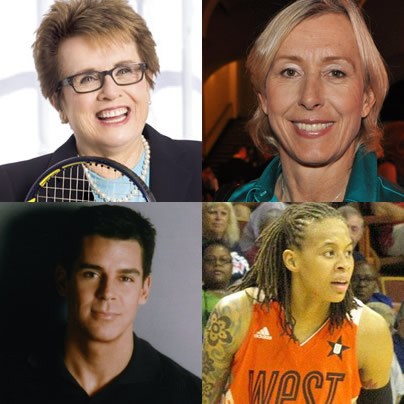
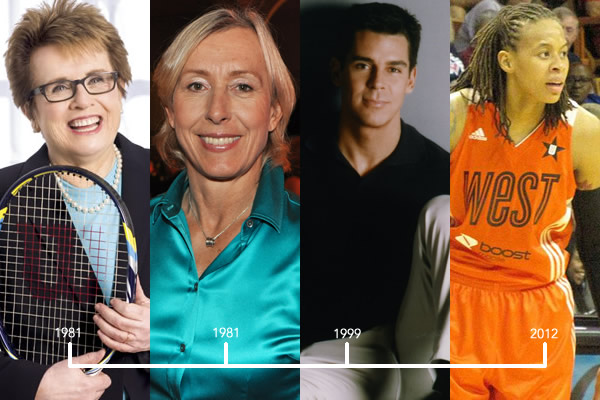
(From left) Billie Jean King, Martina Navratilova, Billy Bean and Seimone Augustus (King photo by Andrew Coppa Photography, Navratilvoa photo by Michael Key, Bean photo by David Vance, Augustus photo by Danny Karwoski)
This timeline reflects the highlights of professional U.S. athletes who have come out in the most popular American sports based on reports in various news media outlets, including OutSports. It is not a definitive list of all athletes that have come out, but experts consider those identified here to have had an important impact in paving the way for more LGBT athletes to come out.
1975: David Kopay, an NFL player with the Washington Redskins, San Francisco 49ers and other teams, comes out as gay shortly after retiring from football. He becomes the first known NFL player, active or retired, to openly discuss his sexual orientation — first with the news media and later in his 1977 bestselling book, “The David Kopay Story: An Extraordinary Self-Revelation.”
FIND MORE OF THE WASHINGTON BLADE SPORTS ISSUE HERE.
1976: Ophthalmologist and tennis player Dr. Renee Richards is outed as a transgender woman when the U.S. Tennis Association refused to allow her to play in the U.S. Open on grounds that she was born as a male and could not compete against women. She challenged the denial in court and won her case the following year, enabling her to become the first known transgender person to play in a professional sport.
1981: Billie Jean King, the nationally acclaimed tennis star, was outed by her ex-partner Marilyn Barnett in a palimony lawsuit. King said later that the disclosure that she was a lesbian resulted in her losing about $2 million in commercial endorsements from companies that dropped her immediately after learning she was gay.
1981: Martina Navratilova, the internationally acclaimed tennis star, willingly disclosed that she is a lesbian just months after the outing of Billie Jean King. Navratilova became the first big name professional athlete to come out of the closet during the height of her playing career. Although the tennis establishment for the most part supported her she later told the LGBT blog OutSports she lost as much as $10 million in endorsements from companies that spurned her because of her sexual orientation.
1988: Major League Baseball umpire Dave Pallone is fired by then Commissioner of Baseball Bart Giamatti, who cites unsubstantiated allegations that Pallone had sex with a minor. Although authorities in Saratoga Springs, N.Y., dropped an investigation into the allegations and in Pallone’s view exonerated him of any wrongdoing, the umpire said Giamatti and other baseball officials didn’t want him in baseball because he’s gay. In his 1990 book “Behind the Mask: My Double Life in Baseball,” Pallone says his firing reinforced the perception that Major League Baseball would not allow gay players or umpires.
1992: Roy Simmons of the NFL, who played for the New York Giants and Washington Redskins in the 1980s, came out as gay in a TV interview on the “Phil Donahue Show,” several years after his football career ended.
1993: Then former Major League Baseball player Glen Burke came out publicly in 1993 in interviews in Sport magazine and NBC’s “Today” show. According to subsequent reports in the media, Burke came out to his fellow players and manager Tommy Lasorda when he played for the Los Angeles Dodgers in the 1970s. The Dodgers traded him to the Oakland A’s reportedly because top management feared news of Burke’s sexual orientation would become public, leading to negative publicity for the team. He is credited with being the first Major League Baseball player to come out to an entire team. Burke died of AIDS in 1995.
1996: Muffin Spencer-Devlin, a three-time tournament winner on the Ladies Professional Golf Association Tour in the 1980s, came out as a lesbian in a March 1996 article in Sports Illustrated, becoming the first female or male professional golfer to come out while still playing.
1999: Major League Baseball player Billy Bean publicly disclosed he’s gay in 1999, four years after his baseball career ended. He began his Major League Baseball career in 1987 and played for the Detroit Tigers, Los Angeles Dodgers, and San Diego Padres. He wrote about his life as a closeted gay ball player in his 2003 book “Going the Other Way: Lessons from a Life In and Out of Major League Baseball.”
2002: Esera Tuaolo, a defensive lineman for nine years in the NFL before retiring in 1999, came out as gay in a 2002 interview on ESPN. He became the third widely known NFL player to come out shortly after retiring. Like the other two – David Kopay (1975) and Roy Simmons (1992) – Tuaolo’s post-career coming out reinforced the longstanding belief that no NFL player could come out while still playing without facing dire consequences.
2005: Sheryl Swoopes, a seven-time Women’s National Basketball Association (WNBA) All-Star who was chosen three times as the league’s most valuable player, came out as a lesbian in 2005 at the height of her career. After being hailed as a role model for lesbians in sports, Swoopes startled LGBT basketball fans in 2010 when news surfaced that she ended her relationship with her female partner and announced she was engaged to marry a man. She has since retired from basketball and is head coach for the women’s basketball team at Loyola University in Chicago.
2007: John Amaechi, a professional basketball player who retired in 2003, came out as gay four years later, becoming the first player in the National Basketball Association (NBA) to come out, either during or after his playing days. His coming out was timed to coincide with the publication of his autobiography, “Man in the Middle.”
2011: Rick Welts, president of the Golden State Warriors, an NBA team, came out as gay in a New York Times interview in May 2011, becoming the first openly gay executive of the NBA and any of the other top U.S. professional sports. LGBT sports enthusiasts say Welts’ status as an out gay person in a high-level executive post in the professional sports world set a precedent for encouraging more pro sports executives as well as players to come out.
2012: Megan Rapinoe, a women’s U.S. professional soccer player with the Seattle Reign team and who is credited with helping the U.S. women’s national soccer team win a Gold Medal at the 2012 Summer Olympics in England, came out as a lesbian in an interview with “Out” magazine. The sports blog SB Nation reported earlier this month Reign team officials will allow the internationally acclaimed soccer star to play for the French soccer team Lyon for the remainder of this year and next year, with the expectation that she will return to Seattle in June 2014.
2012: Seimone Augustus, considered a WNBA superstar with the Minnesota Lynx team, surfaced as an out lesbian and strong advocate for same-sex marriage when she backed the campaign to oppose a 2012 ballot measure in Minnesota to ban same-sex marriage in the state constitution. After the defeat of the ballot measure, Augustus announced plans to marry her partner Lataya Varner in a Minnesota ceremony.
2013: Robbie Rogers, an American professional soccer player, startled the soccer establishment in February of this year by announcing he is gay and was retiring from soccer at age 25, ending his tenure as a member of England’s championship team Leads United. In May, Rogers changed his mind and was quickly snatched up by the Los Angeles Galaxy, making him the first openly gay professional men’s soccer player in the U.S. having the status of an active player.
2013: Brittney Griner, a star rookie on the WNBA team Phoenix Mercury, publicly disclosed she is gay in April of this year. She became the first woman’s professional basketball player to do so at the start of her professional career.
2013: Jason Collins, a professional basketball player who has played on six NBA teams since 2002, including the Washington Wizards, came out as gay in April of this year, becoming the first active athlete associated with one of the four major male team sports (basketball, football, baseball or hockey) to do so. His decision to come out drew widespread support from fellow athletes and fans, including from President Barack Obama and former President Bill Clinton. However, last month Collins became a free agent and is awaiting a contract with a team to continue playing in the NBA.
Sports
Attitude! French ice dancers nail ‘Vogue’ routine
Cizeron and Fournier Beaudry strike a pose in memorable Olympics performance

Madonna’s presence is being felt at the Olympic Games in Italy.
Guillaume Cizeron and his rhythm ice dancing partner Laurence Fournier Beaudry of France performed a flawless skate to Madonna’s “Vogue” and “Rescue Me” on Monday.
The duo scored an impressive 90.18 for their effort, the best score of the night.
“We’ve been working hard the whole season to get over 90, so it was nice to see the score on the screen,” Fournier Beaudry told Olympics.com. “But first of all, just coming out off the ice, we were very happy about what we delivered and the pleasure we had out there. With the energy of the crowd, it was really amazing.”
Watch the routine on YouTube here.
Italy
Olympics Pride House ‘really important for the community’
Italy lags behind other European countries in terms of LGBTQ rights

The four Italian advocacy groups behind the Milan Cortina Winter Olympics’ Pride House hope to use the games to highlight the lack of LGBTQ rights in their country.
Arcigay, CIG Arcigay Milano, Milano Pride, and Pride Sport Milano organized the Pride House that is located in Milan’s MEET Digital Culture Center. The Washington Blade on Feb. 5 interviewed Pride House Project Manager Joseph Naklé.
Naklé in 2020 founded Peacox Basket Milano, Italy’s only LGBTQ basketball team. He also carried the Olympic torch through Milan shortly before he spoke with the Blade. (“Heated Rivalry” stars Hudson Williams and Connor Storrie last month participated in the torch relay in Feltre, a town in Italy’s Veneto region.)
Naklé said the promotion of LGBTQ rights in Italy is “actually our main objective.”
ILGA-Europe in its Rainbow Map 2025 notes same-sex couples lack full marriage rights in Italy, and the country’s hate crimes law does not include sexual orientation or gender identity. Italy does ban discrimination based on sexual orientation in employment, but the country’s nondiscrimination laws do not include gender identity.
ILGA-Europe has made the following recommendations “in order to improve the legal and policy situation of LGBTI people in Italy.”
• Marriage equality for same-sex couples
• Depathologization of trans identities
• Automatic co-parent recognition available for all couples
“We are not really known to be the most openly LGBT-friendly country,” Naklé told the Blade. “That’s why it (Pride House) was really important for the community.”
“We want to use the Olympic games — because there is a big media attention — and we want to use this media attention to raise the voice,” he added.

Naklé noted Pride House will host “talks and roundtables every night” during the games that will focus on a variety of topics that include transgender and nonbinary people in sports and AI. Another will focus on what Naklé described to the Blade as “the importance of political movements now to fight for our rights, especially in places such as Italy or the U.S. where we are going backwards, and not forwards.”
Seven LGBTQ Olympians — Italian swimmer Alex Di Giorgio, Canadian ice dancers Paul Poirier and Kaitlyn Weaver, Canadian figure skater Eric Radford, Spanish figure skater Javier Raya, Scottish ice dancer Lewis Gibson, and Irish field hockey and cricket player Nikki Symmons — are scheduled to participate in Pride House’s Out and Proud event on Feb. 14.
Pride House Los Angeles – West Hollywood representatives are expected to speak at Pride House on Feb. 21.
The event will include a screening of Mariano Furlani’s documentary about Pride House and LGBTQ inclusion in sports. The MiX International LGBTQ+ Film and Queer Culture Festival will screen later this year in Milan. Pride House Los Angeles – West Hollywood is also planning to show the film during the 2028 Summer Olympics.
Naklé also noted Pride House has launched an initiative that allows LGBTQ sports teams to partner with teams whose members are either migrants from African and Islamic countries or people with disabilities.
“The objective is to show that sports is the bridge between these communities,” he said.
Bisexual US skier wins gold
Naklé spoke with the Blade a day before the games opened. The Milan Cortina Winter Olympics will close on Feb. 22.
More than 40 openly LGBTQ athletes are competing in the games.
Breezy Johnson, an American alpine skier who identifies as bisexual, on Sunday won a gold medal in the women’s downhill. Amber Glenn, who identifies as bisexual and pansexual, on the same day helped the U.S. win a gold medal in team figure skating.
Glenn said she received threats on social media after she told reporters during a pre-Olympics press conference that LGBTQ Americans are having a “hard time” with the Trump-Vance administration in the White House. The Associated Press notes Glenn wore a Pride pin on her jacket during Sunday’s medal ceremony.
“I was disappointed because I’ve never had so many people wish me harm before, just for being me and speaking about being decent — human rights and decency,” said Glenn, according to the AP. “So that was really disappointing, and I do think it kind of lowered that excitement for this.”
Puerto Rico
Bad Bunny shares Super Bowl stage with Ricky Martin, Lady Gaga
Puerto Rican activist celebrates half time show

Bad Bunny on Sunday shared the stage with Ricky Martin and Lady Gaga at the Super Bowl halftime show in Santa Clara, Calif.
Martin came out as gay in 2010. Gaga, who headlined the 2017 Super Bowl halftime show, is bisexual. Bad Bunny has championed LGBTQ rights in his native Puerto Rico and elsewhere.
“Not only was a sophisticated political statement, but it was a celebration of who we are as Puerto Ricans,” Pedro Julio Serrano, president of the LGBTQ+ Federation of Puerto Rico, told the Washington Blade on Monday. “That includes us as LGBTQ+ people by including a ground-breaking superstar and legend, Ricky Martin singing an anti-colonial anthem and showcasing Young Miko, an up-and-coming star at La Casita. And, of course, having queer icon Lady Gaga sing salsa was the cherry on the top.”
La Casita is a house that Bad Bunny included in his residency in San Juan, the Puerto Rican capital, last year. He recreated it during the halftime show.
“His performance brought us together as Puerto Ricans, as Latin Americans, as Americans (from the Americas) and as human beings,” said Serrano. “He embraced his own words by showcasing, through his performance, that the ‘only thing more powerful than hate is love.’”
-

 State Department4 days ago
State Department4 days agoFOIA lawsuit filed against State Department for PEPFAR records
-

 Opinions5 days ago
Opinions5 days agoTrans sports bans rooted in eugenics
-

 New York4 days ago
New York4 days agoPride flag raised at Stonewall after National Park Service took it down
-

 India4 days ago
India4 days agoTrans students not included in new India University Grants Commission equity rules

